Stage 2 - Lecture notes 2 PDF

| Title | Stage 2 - Lecture notes 2 |
|---|---|
| Course | Clinical Psychology and Mental Health |
| Institution | University of Sussex |
| Pages | 3 |
| File Size | 110.7 KB |
| File Type | |
| Total Downloads | 6 |
| Total Views | 191 |
Summary
Stage 2 worry...
Description
Essay question: Organisations like to inform us of their corporate social responsibility (CSR) credentials and ethical business conduct. However frequent stories in the news media, suggests that in reality many behave somewhat differently, leading to the accusation of 'greenwashing' when this occurs. With this in mind, explain what is meant by CSR, the reasons why this approach is seen as important in contemporary business and society and discuss the extent to which such activity is genuine through reference to examples of actual business activity.' OAWG Stage 2 Assessment 1. Thesis statement: Corporate social responsibility has been an ongoing issue for many years. It has been an increasing problem as there are many companies that create a ‘responsible’ facade in order to brainwash their customers into believing that their organization is being socially responsible, as their main concern tends to primarily be their economic results of their decisions. Corporate Social Responsibility (CSR) is a concept whereby companies combine social and environmental concerns into their business performance and in their interaction with their stakeholders on a voluntary basis. It has been argued that there are certain actions are believed to not be genuine when it comes to CSR, creating a bad reputation known as greenwashing. This essay will discuss the importance of integrating corporate social responsibility into a contemporary business, and the extent to which CSR actions are considered genuine without it being labeled as greenwashing. 2. Annotated bibliography
1st Source: Bui, Thi Lan Huong. "The Vietnamese Consumer Perception on Corporate Social Responsibility." Journal of International Business Research 9.Sl 1 (2010): 75. Web. Commentary: This is an article that focuses on the phenomenon of corporate social responsibility (CSR) more globally in developing countries. This article uses Vietnam as one example of a developing country undergoing rapid economic growth coupled with societal challenges, driven by increased business activity. The parts of the article that will have most relevance to inform this essay is page 3 & 8 in which they discuss the politico-economic context in which Vietnam’s economy is carried out, and also the modernity in which Vietnam has revolutionised in the last two decades. This article is interesting as it gives us an insight as to how important being socially responsible and having an ethical conduct can be for a business in Vietnam. It also shows how Vietnam has improved ever since they started being conscious socially.
2nd Source: Wiley, J. (2009). UoS - Shibboleth Login. [online] Ebookcentral.proquest.com. Available at: https://ebookcentral.proquest.com/lib/suss/reader.action? docID=480454&ppg=1 Commentary: This is an insightful article that talks about the effects on the CSR reputation (focused on stakeholder theories) John Wiley gives a good general opinion on greenwashing in a customers point of view and how consumers unconsciously think they know what's good and what's bad, however im not sure if I will be including it into my essay as it doesn’t necessarily answer the essay questions
3rd Source: Carvalho, Sergio, W. Muralidharan, and Etayankara Bapuji. "Corporate Social ‘Irresponsibility’: Are Consumers’ Biases in Attribution of Blame Helping Companies in Product–Harm Crises Involving Hybrid Products?" Journal of Business Ethics 130.3 (2015): 651-63. Web. Commentary: This interesting article talks about how companies who have created hybrid products tend to shift the blame to their stakeholders when consumers start to doubt their actions, which then leads them to question their actions and whether or not they’re being ethically responsible. It also talks about the This article will be useful to me as it gives a great insight into greenwashing and how companies tend to shift the blame when it comes to being ethically responsible. It also shows the customers' point of view considering they tend to lean much towards ethically responsible businesses 4th Source: Wieland, Andreas, and Robert Handfield. "The Socially Responsible Supply Chain: An Imperative for Global Corporations." Supply Chain Management Review 17.5 (2013): 22-29. Web. Commentary: This article provides an insight as to how the tragedy that occured in Rana Plaza made companies realize that corporate social responsibility is crucial and how up until then companies have opted to avoid creating socially responsible supply chains in order to steer away from fatalities such as the one previously mentioned. I'm going to incorporate this article into my essay as it provides information on how stakeholders, since this tragedy, have shown an increasing interest in environmental and social issues related to international business. Areas such as supply chain sustainability and corporate social responsibility have been gaining a large amount of media attention, and also attention in the corporate world.
5th Source: Cohen, D. (2019). Shibboleth Authentication Request. [online] Searchproquest-com.ezproxy.sussex.ac.uk. Available at: https://search-proquestcom.ezproxy.sussex.ac.uk/docview/195692832?rfr_id=info%3Axri%2Fsid%3Aprimo Commentary: This is an interesting article that gives an insight into how CSR takes place in scandinavia. It is a case study which answers 3 questions; do Scandinavians agree with external observers that firms in their countries demonstrate superior levels of corporate responsibility, relative to other reputation drivers, to what extent does corporate responsibility predict corporate reputation for the countries in our dataset; to what extent does corporate responsibility predict stakeholder intent in these countries to engage in supportive behavior toward the firm? These are all insightful questions which I may incorporate it into my essay as it’s interesting to see how different countries manage their businesses and if in fact they take CSR seriously.
3. Sentence outline
Introduction (150 words)
Define terms: Use Carvalho, Sergio (2015) insight where it talks about companies shifting the blame to different stakeholders when it comes to being socially responsible. State the thesis: this essay will argue that despite business integrating beneficial actions into their system, many companies do them for the wrong reasons making their actions seem insincere, hence the term greenwashing. Outline the structure: Introduce CSR and define it giving examples. Introduce greenwashing briefly. Highlight some arguments that suggest why social responsible actions are insincere. Find a counter argument for greenwashing
Main body (1250 words)
Section 1: CSR → use needles point of view on CSR (300) Section 2: Greenwashing → give a detailed explanation using 3rd source Section 3: Use a counter argument for greenwashing Section 4: Refutation and reaffirmation of importance of CSR
Conclusion: Re-emphasise the main claim (100 words)
4. Reflection This stage has helped me organise the structure of my essay and it has also helped me organise the order of the content im going to use making it easier for when I write it....
Similar Free PDFs
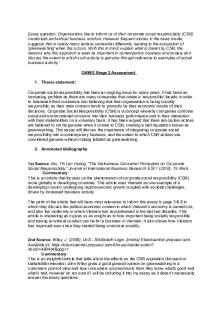
Stage 2 - Lecture notes 2
- 3 Pages
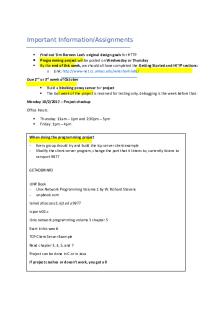
2 - Lecture notes 2
- 5 Pages

Formal Essay Stage 2
- 7 Pages

Lecture notes, lecture 2
- 3 Pages

Germinal stage - Lecture notes 3
- 2 Pages

Business propsal stage 2
- 29 Pages

2 Biodiversity - Lecture notes 2
- 33 Pages
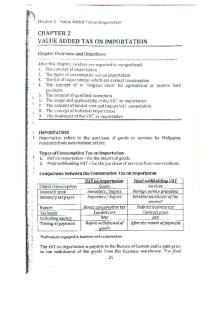
Chapter 2 - Lecture notes 2
- 30 Pages
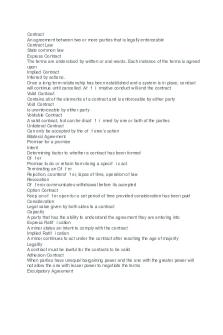
Blaw 2 - Lecture notes 2
- 4 Pages
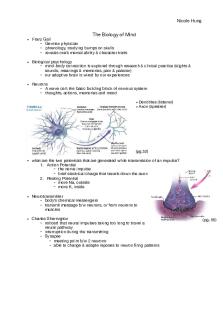
Chapter 2 - Lecture notes 2
- 4 Pages
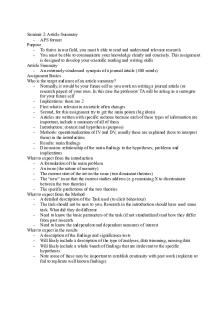
Seminar 2 - Lecture notes 2
- 2 Pages

Micro 2 - Lecture notes 2
- 18 Pages

2 Sources - Lecture notes 2
- 4 Pages

Prof 2 - Lecture notes 2
- 3 Pages

Mast200 2 - Lecture notes 2
- 3 Pages

Quiz-2 - Lecture notes 2
- 7 Pages
Popular Institutions
- Tinajero National High School - Annex
- Politeknik Caltex Riau
- Yokohama City University
- SGT University
- University of Al-Qadisiyah
- Divine Word College of Vigan
- Techniek College Rotterdam
- Universidade de Santiago
- Universiti Teknologi MARA Cawangan Johor Kampus Pasir Gudang
- Poltekkes Kemenkes Yogyakarta
- Baguio City National High School
- Colegio san marcos
- preparatoria uno
- Centro de Bachillerato Tecnológico Industrial y de Servicios No. 107
- Dalian Maritime University
- Quang Trung Secondary School
- Colegio Tecnológico en Informática
- Corporación Regional de Educación Superior
- Grupo CEDVA
- Dar Al Uloom University
- Centro de Estudios Preuniversitarios de la Universidad Nacional de Ingeniería
- 上智大学
- Aakash International School, Nuna Majara
- San Felipe Neri Catholic School
- Kang Chiao International School - New Taipei City
- Misamis Occidental National High School
- Institución Educativa Escuela Normal Juan Ladrilleros
- Kolehiyo ng Pantukan
- Batanes State College
- Instituto Continental
- Sekolah Menengah Kejuruan Kesehatan Kaltara (Tarakan)
- Colegio de La Inmaculada Concepcion - Cebu